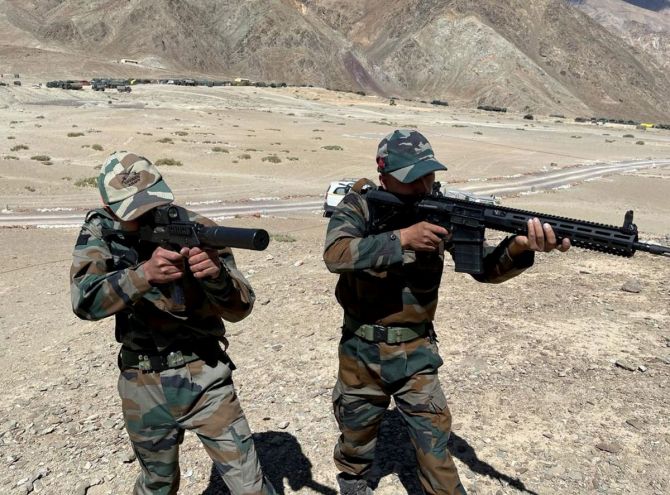'Three decades of intensive discussions, protocols and Confidence Building Measures were jettisoned one fine morning in 2020.'
'The primary lesson that has been learnt is that that there is no reliability about the Chinese.'

"There are forces arrayed across both sides of the border, buffers are being created, stand-offs have occurred at two places at least, infrastructure is being scaled and there is a grave distrust," says Lieutenant General Rakesh Sharma, retired, former commander of the Leh-based Fire and Fury Corps.
"We cannot accept this situation as it will cause immense strain on our nation to maintain such a large deployment of forces," General Sharma tells Rediff.com's Archana Masih in the concluding part of a must-read interview.
- Part 1 of the Interview: 'We cannot allow China to swallow our territory'
- Part 2 of the Interview: 'Chinese are in the game of ambitions'
In your opinion, is a diplomatic solution still possible?
There has been limited progress in the Working Mechanism for Consultation and Coordination meetings.
If you look at the statements ensuing from the visit of Chinese diplomats to India in the last six months -- Foreign Minister Qin Gang, Defence Minister Li Shangfu, former FM Wang Yi, including the consul general in Calcutta and the ambassador in Delhi -- all of them convey an institutional position.
They only repeat one typical sentence, which is the 'maintenance of normal border management and control', but from the Indian point of view, the situation is grossly abnormal!
There are forces arrayed across both sides of the border, buffers are being created, stand-offs have occurred at two places at least, infrastructure is being scaled and there is a grave distrust.
Hence, the situation is absolutely abnormal and has been pointed out often by the Indian foreign minister.
There is no matching of minds on this issue. We cannot accept this situation as it will cause immense strain on our nation to maintain such a large deployment of forces.
How can we inflict the same kind of pressure on the Chinese elsewhere? Perhaps amassing allies in the Pacific and Africa, Latin America, wherever China has appeared and angered local governments?
India's leadership role in the global south is one attempt to reach out to these countries -- especially ASEAN.
However, 127 countries conduct maximum trade with China. They have invested heavily in the Belt and Road Project and are building 100 ports -- 13 in Indian Ocean Rim countries itself.
The BNS Sheikh Hasina port in Bangladesh built by China can accommodate six submarines and eight frigates. The Bangladesh Navy doesn't even have six submarines!
The Chinese purchasing influence has tied down all these countries, despite the fact that India has a great relationship with these nations.
By history, culture and peoples, India is a likeable country -- we are liked by the global south -- but the Chinese tend to purchase influence by putting them into a debt trap.
The Chinese rate of interest is higher and their investments have greater contractual obligations which tie down these countries, but they require funds for developing and get it from whoever is supplying.
The Bretton Woods institutions have too many regulations that these countries do not find feasible which makes them turn to China for assistance.
However, India's leadership role in the global South is well recognised. We have had historic relations with countries of Africa and our culture is spread across Southeast Asia.
India's benign cultural role is acknowledged, but then the Chinese also have a large diaspora in Southeast Asia and huge investments across Cambodia, Laos, Vietnam etc, and these countries have to balance their relationship between India and China.
China is indulging in cheque book diplomacy which is completely different from the diplomacy practised by India.

What are the military lessons that India has learnt from this stand-off?
The basic lesson is not to trust China.
India and China have signed six treaties from 1993 onwards and conducted the Joint Working Group meetings that received further momentum after Rajiv Gandhi's visit in 1988.
Three decades of intensive discussions, protocols and Confidence Building Measures were jettisoned one fine morning in 2020. Therefore, the primary lesson that has been learnt is that that there is no reliability about the Chinese.
We have to learn to distrust the Chinese because their intent is not clear.
They announced the changed names of certain places in Arunachal Pradesh when there is a 2005 treaty which states that it is a settled area and Arunachal Pradesh is our territory.
The McMahon Line was signed between Tibet and British India in 1914-1915 when Tibet was not a part of China. The treaties signed by sovereign nations cannot be rescinded by China.
China's expansionist ambitions are clear and we have learned it the hard way. We have to ensure that their quest for expansionism is denied.
Feature Presentation: Aslam Hunani/Rediff.com











 © 2025
© 2025